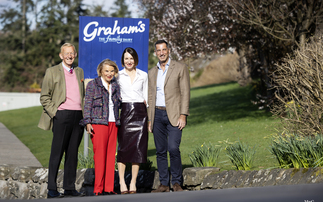
A Yorkshire tenant farming family have won a three year long battle to stop a solar farm development, in what has been described as a land mark case for the tenanted farming sector.
The decision sent out a crucial message to all other developers that they cannot treat tenant farmers as 'merely collateral damage.'
Rob and Emma and their two children, Sebastian and Lizzie have campaigned tirelessly to prevent almost half of their farm being taken out of food production to accommodate for the solar panels.
Today ( October 10) the Strategic Planning Committee of North Yorkshire County Council refused consent against the recommendation of the planning officer. It was understood the vote against the application was 10 to 4 and therefore a 'significant victory' for the Sturdy family and the tenanted sector.
In making the decision, the committee expressed concern about the exceptional impact on the tenant farming business, the loss of best and most versatile agricultural land and the lack of any alternative site appraisal.
The Tenant Farmers Association stood by the Sturdy family in their fight.
The TFA chief executive, George Dunn says:
"I am hugely delighted for Rob and Emma Sturdy who have fought a long-running battle against this inappropriate solar farm application. The TFA has been pleased to have stood with them in their fight. It is good that the planning committee understood its responsibility to consider the impact on the personal circumstances of Rob and Emma as tenants of the site and also in respect of the loss of best and most versatile agricultural land.
"I am greatly appreciative of the due diligence of the planning committee even though its planning officer recommended approval of the application. We will wait to see if the developer decides to appeal this decision, but it sends a really crucial message to all other developers that they cannot treat tenant farmers as merely collateral damage.
"I would hope it would also be clearly understood by all planning officers up and down the country that the impact on the personal circumstances of tenant farmers is a material consideration which they must take into account when they reach their decisions in respect of the recommendations to planning committees.
"A good day for the Sturdy family and a good day the tenant farmers generally."
Background of the Sturdy family's campaign
Robert and Emma live with their two children, Sebastian and Lizzie, at Eden Farm near Old Malton in North Yorkshire. Robert is the second generation of a three generation Agricultural Holdings Act (AHA) to farm across 113 hectares (280 acres).
Altogether, 52ha has been earmarked for solar panels. This is a combination of 45ha (110 acres) of their land, and 8ha (20 acres) of a neighbouring tenant farm, all of which is valuable farmland meant for food production.
The Sturdy family claim there has been little direct consultation about the solar proposal up to this point. And, of course, the idea of losing a lifetime's work, half of their family business and security and investment in the farm over generations is, they say, ‘utterly devastating' and something they cannot possibly comprehend.
Solar farm
Robert says: "My grandad started improving the land back in 1954. He came here and started investing and my father did the same, improving the drainage. I have carried it on."
For Robert and Emma this is not about being against the development of solar farms. In fact, that could not be further from the truth - both recognise the importance and need for renewable energy. But they believe it should not be a free for all and the location of where solar development is put must be better thought through - not at the expense of valuable, scarce farmland which generates food for us all to eat.
Emma is frustrated by the lack of protection from AHA and believes the moral compass in disputes like this very quickly becomes absent.
Food production
She says: "Solar is totally unregulated in this country, but obviously a lot more profitable than the income you would receive from tenant farming. "The AHA is not strong enough to protect tenants from this sort of non-agricultural development. So, we find ourselves in a really desperate situation from many aspects.
"When Rob's dad signed the AHA in 1971, the estate agreed to Rob's father and to Rob and his offspring, to farm this land and we have kept to our side of the bargain, above and beyond. Rob is a good farmer, a good tenant, and the land is being improved constantly. He farms positively and as well as he can with the land and the restrictions that we have got."
Financial and emotional cost
Inevitably the fear of the scale of the development, and the unrelenting campaigning over the last three years has not only come at a financial cost for the Sturdy family, but has had an undeniable toll on their family's emotional well-being too.
Emma says: "There is no escape. We are out campaigning and then go home and sit and think, will everything be okay? It is everything. Everything is on hold right now. "It has quite honestly taken over our lives. We are completely different people to the people we were three years ago. [Campaigning] has become my full-time job.
"My kids are sick of hearing about solar farms. I stayed at home to be with my kids and to be in the moment, but this has taken that all away; three years of our lives, but we had no other choice."
Read also: Tenant farmers feel frustrated by false promises
Rock Review: tenant farmers must get full support
Tenant farmers inquiry must be more than a 'talking shop'
Emma and Rob say despite the adversity they are committed to working hard with the landlord to find a solution although it is, they say, about ‘standing up for what you believe is right' and ‘knowing your worth'.
Emma says: "We know the difference we have made here and what is being proposed is very wrong." When it comes to financial costs, Emma and Rob are concerned the family farm business would simply be ‘unsustainable' if they were to lose the land, and if anything, they would need ‘additional acres' right now given the current economic climate.
Custodians of the land
With 64 per cent of agricultural land run by tenant farmers, the couple are passionate about their family's story, wanting to highlight how reliant the sector is on the talent and experience of tenant farmers as custodians of the land.
Rob says: "If it was poor land and I struggled to grow crops on it, I would hold my hands up and say it is a good idea, but it could not be further from the truth.
"When you have good farmland, you must look after it. If we lose tenants, not only do we lose farming experiences, generations of it, but also access into a workplace for young farmers and new entrants. Buying a farm is beyond the capability of most and it must be recognised."
Emma believes this application should never have got this far, but puts some of the blame on the outdated 1986 AHA, which in principle is meant to provide security and shield tenant farmers from volatility.
Tenant security
Emma says: "These tenancies are not up to scratch. When they were agreed, nobody had heard of solar or wind farms. "The clauses were there to protect landlords, and to stop Rob converting a building. It was not about taking 100 acres of land at a time."
When both asked about the scenario of losing the land and having to hand it over, both used the word ‘disbelief' in their reply; disbelief that any planner could justify saying yes to taking away valuable farmland from a family run business.
If the plans do go ahead Rob and Emma would have a reminder of it daily, with the development set to take place in the middle of farm, with remaining farmland on the east and west side.
Rob says: "I will feel that we have given it our all and tried everything. We know what is right for this farm and this farm needs that farmland to survive. This is why we are standing our ground how we are."
Tenant Farmers Association
George Dunn, chief executive, Tenant Farmers Association says: "There is significant pressure on the agricultural sector to sacrifice land for alternative uses.
"These include tree planting, solar energy, biodiversity net gain, nutrient neutrality, rewilding and the usual alternative uses for housing, commercial use and industrial use.
"However, it is vital that we consider the impact of these land use changes on our food security and on the opportunities available to new entrants and progressing farmers.
Government
"The Government has set targets for maintaining our food self-sufficiency ratio as part of our food security and has set a policy to at least maintain the current size of the let sector of agriculture.
"While there will always be competition within private markets for access to land, the combination of the Government's objectives for land use, food security and access to land for new and developing businesses should mean that landowners should not be rewarded from public money when they remove land from the tenanted the sector of agriculture.
"Where tenants lose land from Agricultural Holdings Act tenancies for alternative uses such as solar, we need to see a significant ramping up of the compensation payable so that it equates to the tenants real loss rather than the simplistic six times the rent passing as set out within the current legislation."
George Dunn has recently written to every member of the North Yorkshire planning committee asking them to ‘vote against this proposal as it would be a travesty if this application was allowed to succeed'.
He added: "Acceptance of this application would go against current public policy on food security, maintaining best, and most versatile, agricultural land, improving landscape and biodiversity, and protecting the resilience of the tenanted sector of agriculture."




























